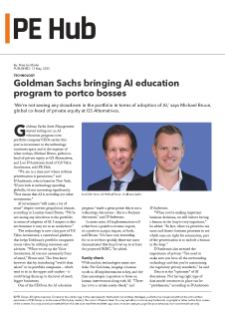Goldman Sachs Bringing AI Education Program to Portco Bosses
In an article originally published in PE Hub, Michael Bruun and Lou D’Ambrosio shared how they are educating portfolio company CEOs on how to leverage artificial intelligence.
Goldman Sachs Bringing AI Education Program to Portco Bosses
‘We’re not seeing any slowdown in the portfolio in terms of adoption of AI,’ says Michael Bruun, global co-head of private equity at GS Alternatives.
Goldman Sachs Asset Management started rolling out an AI education program to its portfolio company CEOs earlier this year as investment in the technology continues apace and at the expense of other outlays, Michael Bruun, global cohead of private equity at GS Alternatives, and Lou D’Ambrosio, head of GS Value Accelerator, told PE Hub.
“We are in a time now where ruthless prioritization is paramount,” said D’Ambrosio, who is based in New York. “If you look at technology spending globally, it’s not increasing significantly. That means that AI is crowding out other investments.”
AI investments “still make a lot of sense” despite current geopolitical climate, according to London-based Bruun. “We’re not seeing any slowdown in the portfolio in terms of adoption of AI. I suspect in this environment it may act as an accelerator.”
The technology is now a key part of GS Value Accelerator, a centralized platform that helps Goldman’s portfolio companies create value by utilizing resources and advisors. “When we set up the Value Accelerator, AI was not necessarily front of mind,” Bruun said. The firm knew however that by introducing “world-class talent” to its portfolio companies – which tend to sit in the upper mid-market – it could bring them up to the level of much bigger businesses.
One of the CEOs in the AI education program “made a great point: this is not a technology discussion – this is a business discussion,” said D’Ambrosio. In most cases, AI implementation will either have a positive revenue impact, or a positive margin impact, or both, said Bruun. “It’s been very rewarding for us to see how quickly those use cases demonstrated that they lived up to at least the projected ROIC,” he added.
Sanity Check
With modern technologies come new risks. For Goldman, keeping a human touch in AI implementation is key, and the firm encourages its portcos to focus on human intervention along with AI. “There has to be a certain sanity check,” said D’Ambrosio.
“When you’re making important business decisions, we still believe having a human in the loop is very important,” he added. “In fact, when we prioritize use cases and dissect business processes to see which ones are right for automation, part of the prioritization is to include a human in the loop.”
D’Ambrosio also stressed the importance of privacy. “You need to make sure you have all the surrounding technology and that you’re maintaining the regulatory privacy standards,” he said. Data is at the “epicenter” of AI discussions. Not having right type of data model structures in place can be “problematic,” according to D’Ambrosio. “What comes in is what comes out,” he added.
Risks are not limited to the portfolio companies themselves. AI’s impact on the environment – particularly around energy usage – is an area Goldman is aware of. “I don’t see a misalignment between objectives,” said Bruun. “We see tremendous efficiency gains related to AI. If that leads to incremental environmental costs, then we need to work towards mitigating those.”
“AI can provide the predictive analysis to make energy use more efficient,” said D’Ambrosio. “Its environmental impact needs to be considered but AI may also be part of the solution to that problem.”
Profound Benefits
One Goldman-backed clinical trials business uses AI to automate processes and diligence around clinical trials, increasing its throughput significantly, according to the firm. “With the use of AI, certain pharmacological solutions will be brought to market faster than they otherwise would,” said D’Ambrosio. “We tend to talk about revenue and profit, but companies using AI can also deliver profound societal benefits.”
Goldman declined to name the company, but the firm has made several investments in that sector. It teamed with EQT in 2021 to acquire Parexel, a global clinical research organization, for $8.5 billion. The same year, it invested over $230 million in 4G Clinical, a randomization and trial supply management company.
Other AI use cases include a large premium consumer goods business that utilizes AI to help its call center agents to have more intelligent conversations; an insurance company using AI to identify doctor codes to expedite insurance claims and an edtech business helping to generate content with higher relevance.
Goldman has been active in the insurance segment. It acquired insurance broker Clear Group from ECI Partners in 2022 and in 2023, the firm picked up Doxa Insurance Holding.
The firm made a move in edtech in 2024 with the acquisition of Interplay Learning, an Austin-based provider of immersive skilled trades training.
More innovations are likely on the way. “If we send out something about AI to our portfolio companies, the interest is extremely high,” said Bruun.

